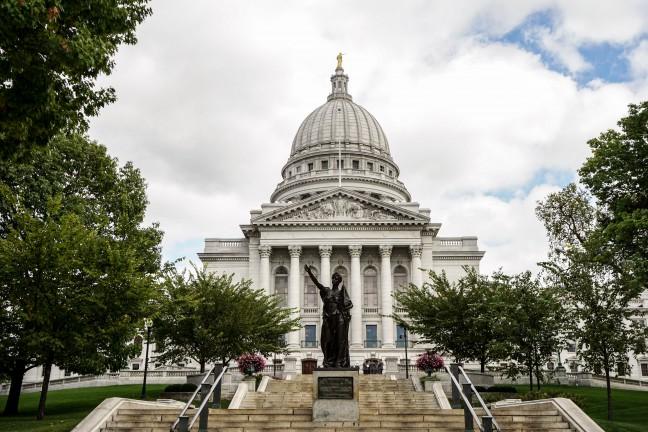Republican state legislators introduced a series of bills that would legally define riots and create legal repercussions related to riot participation.
The first bill legally defines a riot and makes participating in a riot a felony. Participating in a riot would be a Class I felony, punishable with a fine up to $10,000 or imprisonment for three and a half years or both, under the legislation.
The second bill classifies blocking a thoroughfare as a misdemeanor.
Lastly, the third bill classifies participating in a riot while armed with a weapon as a felony.
State legislators discussed this series of bills during a Sept. 21 hearing.
Rep. John Spiros, R-Marshfield, an author of the bills, said the proposed definition of a riot is a public disturbance that could cause violence, injury, property damage or threat of violence, and includes three or more people.
The bills introduced were introduced partly as a response to riots last year that occurred in the Sherman Park neighborhood of Milwaukee, where 23-year-old Sylville Smith was shot by a Milwaukee Police Department officer.
According to Spiros, the goal of this legislation is to protect individuals, communities and properties, prevent harm and set guidelines.
But University of Wisconsin sociology professor Pamela Oliver, along with Rep. Chris Taylor, D-Madison, commented how the proposed bills would be criminalizing protesting.
Oliver said because participating in a riot would be considered a felony, the bill could criminalize everyone in a crowd at a protest where any illegal activity occurs.
“If that’s not what this bill is about, then what is it about?” Oliver said.
Taylor echoed Oliver’s sentiments, saying that as the bills stand, everyone present at a protest where one person takes threatening action can be charged with felonies, regardless of intent. Presence, Taylor said, makes people participants.
Rep. Melissa Sargent, D-Madison, said the definition of free speech needs to be written carefully and safely, so free speech is still honored.
Both Spiros and Taylor commented that the bill’s authors are in committee, trying to amend the legislation to reflect intent and separate bystanders from prosecution.
Spiros said that because Wisconsin has no legal definition of a riot, the bills have “a role to play.” Taylor, on the other hand, said because unlawful assembly legislation already existed, they are irrelevant.
“I don’t think they’re necessary, and I don’t see the need,” Taylor said.
Oliver said most activities usually involved in rioting are already against the law.
Harming people, damaging property, throwing things and blocking traffic can get people arrested currently. Disruptive protest is already illegal, Oliver said.
“Part of protesting is trying to cause trouble,” Oliver said.
In addition to the need for demonstration regulation, legislators also are debating how these bills interact with citizen’s rights to speech and assembly.
While Oliver said that whether something is constitutional or not changes frequently depending on what the U.S. Supreme Court decides, Taylor argued these bills aren’t constitutional right now because of the intent component.
Spiros, however, said how the bills are meant to protect demonstration.
“The biggest thing people [should] understand is that this bill in no way limits people’s ability to demonstrate,” Spiros said. “[We’re trying to] prevent a demonstration from becoming a riot.”


